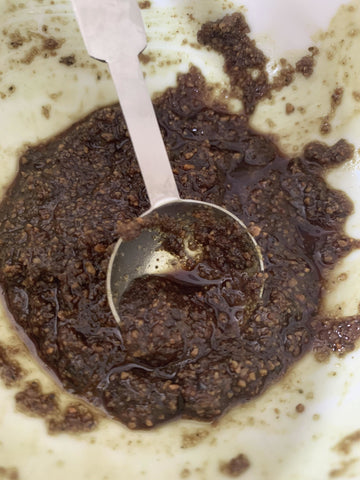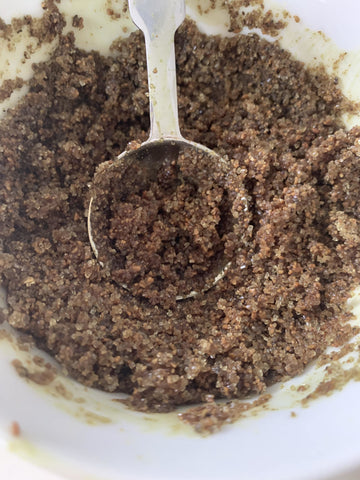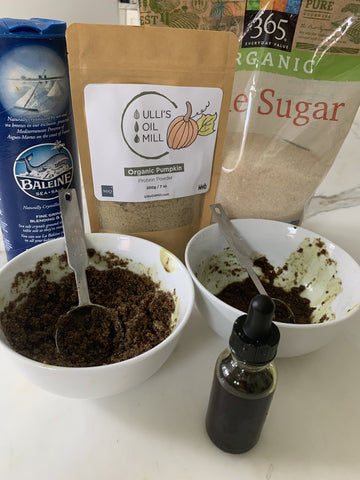Pumpkin Seed Oil: The Benefits for Your Skin & Face
Is pumpkin seed oil the next trend in face and skin care?
Many different oils for your face and skin have been popular over the years - tea tree oil, argan oil, and grapeseed oil, to name a few. If you’re looking for an oil that can help balance your skin, especially your face, look no further than pumpkin seed oil for your skincare routine. Not only is it great for acne-prone skin, it’s full of naturally occurring ingredients that aid in a healthy glow all around.
Bonus: read to the end of the article for Ulli's DIY recipe for a beauty scrub using our organic, cold-pressed pumpkin oil (and pumpkin protein powder) that is perfect for skin health!

Nutrients in pumpkin seed oil and the benefits for your skin and face
Pumpkin seed oil is a natural beauty product filled with essential fatty acids, antioxidants, and vitamins that help combat acne, improve skin tone and renewal, and calm redness and irritation. Here are some things you should know about some of the nutrients in pumpkin seed oil for your skin health.
Linoleic acid (omega-6)
Linoleic acid is one of the major combatants of acne available in pumpkin seed oil. It moisturizes, helps with redness and irritation, and helps skin heal faster. Linoleic acid serves as a natural exfoliant and helps treat hyperpigmentation. People with higher levels of linoleic acid are less acne-prone, so raising these levels by adding linoleic acid to your skin is one of the ways you can fight acne.
Linolenic acid (omega-3)
Along with linoleic acid, omega-3s are also key to healthy skin appearance and function, and a topical application of linolenic acid is a great way to reap the benefits of this nutrient. Omega-3s can also reduce the effects of photodamage from UV exposure, and reduce the signs of skin aging. Ingesting either of these essential fatty acids is just as effective as applying to the skin, so take your pick and enjoy the perks.
Tocopherols
Tocopherol is an antioxidant that helps protect your skin against the sun. When included in products meant for your skin and face, tocopherols absorb UV rays and prevent skin damage via free radicals brought on by UV exposure. They also help protect against damage from free radicals related to pollution, have anti-inflammatory properties, and moisturize the skin.
Sterols
If you’re looking for a nutrient that helps protect against sun damage and assist with cell regeneration, sterols can help! Plant sterols have anti-inflammatory properties, which can improve swelling from acne or other skin troubles. They’re also great with dry skin conditions because sterols lock in moisture. There have been studies on aloe sterols showing that taking it as an oral supplement has helped with skin elasticity.
Vitamin C
The very useful vitamin C can improve your skin in a variety of ways, including reducing redness, combatting hyperpigmentation, reducing under-eye wrinkles, healing damaged skin cells, improving hydration, and more. Even taking vitamin C as a supplement can improve the texture of your skin, protect you from the sun, and help heal wounds, among other things.
Carotenoids
Like many of the nutrients on this list, carotenoids are naturally occurring in skin. Adding more if your face and skin need a little help can brighten and improve your skin tone, protect you from the sun, and aid in firmness, based on a study done on Lutemax.
Zinc
Another acne-fighting superhero, zinc is great for inflammatory acne and scarring. While you might think about oral zinc as something that boosts your immune system, topical and oral zinc can both work to clear acne by removing the bacteria that causes it from the skin.
Magnesium
If acne is a problem for you, magnesium is an essential nutrient to stabilize your hormones. This mineral lowers cortisol levels and improves your cellular processes, all things that add up to helping your skin look better.
Potassium
Your first thought about potassium is probably related to bananas, but you can find this mineral in pumpkin seed oil as well. While it isn’t absorbed through the skin cells, potassium can add moisture to your skin and face.
For more details on the nutritional and mineral composition of styrian pumpkin seed oil, you can visit this journal article by Gilbert O. Fruhwirth and Albin Hermetter of Institute of Biochemistry,Graz University of Technology,
Graz, in Austria.
Is pumpkin seed oil right for your face?
If the benefits of the nutrients listed above sound like things your skin needs, chances are, it’s time to add pumpkin seed oil into your skincare routine. Whether you add it to your diet or use it topically, pumpkin seed oil benefits skin in a variety of ways. If you are battling acne, dryness, dull skin, oily skin, or dealing with other types of inflammation and scarring, you’ll definitely want to work it into your skin renewal regimen.
A DIY Beauty Scrub Recipe using Ulli’s Organic Pumpkin Seed Oil
Here is Ulli’s own recipe for a beauty scrub for your face and skin that uses Our Organic Cold-Pressed Pumpkin Seed Oil (as well as our Pumpkin Protein Powder)
We use this Pumpkin Oil Scrub on your hair tips, scalp, face, and body skin.

You can try two different body scrubs:
Option 1: Mix pumpkin protein, pumpkin oil, and sea salt.
Option 2: Mix pumpkin protein, pumpkin oil, and organic sugar.

It leaves the skin very smooth and hydrated!

